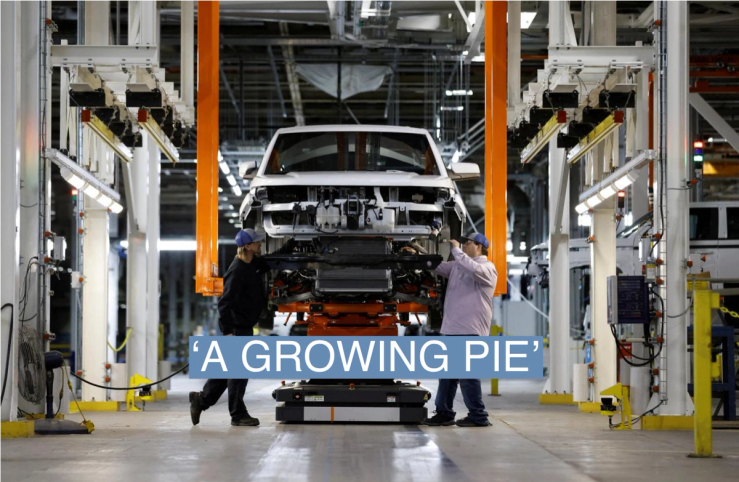The News
The strike of unionized auto workers in the U.S. that has plagued the Big Three for more than a month expanded to another new plant this week. And General Motors on Tuesday made clear the strike’s toll on its bottom line: $800 million in lost vehicle production so far. EVs are a major factor in the companies’ dispute with the United Auto Workers, with big unsettled questions about whether unionized workers will be included in automakers’ new partnerships with EV battery manufacturers, and the risk that automation and streamlined designs will result in overall lower wages and job opportunities in EV-centric factories.
But it doesn’t have to be that way.
Tim’s view
EVs needn’t be an existential threat to workers, and can lead to net job gains. But automakers can’t achieve that outcome alone, however, and need more government support to cultivate a broader, job-rich EV economy.
A recent study by the World Resources Institute focused on Michigan, and anticipated employment changes under a high-electrification scenario in which EVs reach 62% of new car sales by 2030 (according to Bloomberg, a more realistic estimate is 52%). The WRI analysis described a wide range of possible labor outcomes, from 56,000 auto-related jobs gained in Michigan by 2030, to 47,000 jobs lost. It all depends on whether state policymakers do more to incentivize investments in all the EV-adjacent industries beyond auto assembly per se, especially battery production and installing and maintaining charging infrastructure.
“There are some very legitimate concerns about the downward trajectory of job quality in the auto industry,” said Devashree Saha, the report’s lead author and director of WRI’s U.S. clean energy economy program. “If you do everything right, there is going to be a net job gain. But that’s small comfort to workers or communities who lose jobs because a facility shuts down. So how the state provides support to those communities will be key to sustain public support for the transition.”
Saha recommends that Michigan do more to draw new battery gigafactories away from southern states like Georgia that have attracted most of that investment since the passage last year of the Inflation Reduction Act. More public funding is needed for apprenticeship and retraining programs, as well as grade-school and university engineering programs. Crucially, she said, Michigan needs to do much more to incentivize buyers to purchase EVs, to support jobs in related fields; today, the state ranks near the bottom for EV adoption.
“We shouldn’t underestimate the scale of what is required to build up an entire supply chain,” she said. “This isn’t a zero-sum game, it’s a growing pie.”
Solving disputes with the UAW — some of which predate the EV transition — would also bolster broader investor confidence in the emerging U.S. clean energy manufacturing sector, producing things like solar panels or heat pumps, which is almost entirely reliant on Biden administration subsidies and tax incentives. The possibility that strikes and job losses sap political support for those incentives makes any big investment in clean energy manufacturing seem like more of a risky bet to private equity investors and banks.
Know More
GM reported on Tuesday a net income of $3 billion in the third quarter, about 7% less than the same period last year, while beating analysts’ expectations. But the company also reported some wrinkles related to its EV foray, which drove the company’s share price to its lowest point in three years.
CEO Mary Barra, in a letter to shareholders, said the company plans to slow-walk its electric car production plans in North America to “adjust to slower near-term growth in demand” and work on engineering improvements “that will make our vehicles less expensive to produce, and more profitable.” Last week, the company also pushed off its plan to produce electric trucks until late 2025.
Room for Disagreement
If automakers themselves seem reluctant to meet labor demands for improving wages and working conditions in the EV transition, it may be in part because EVs are still not profitable. The Big Three essentially subsidize their EV production lines with sales of traditional cars and trucks, and if GM’s slowdown announcements are an indication, executives are still nervous about how long they’ll be willing and able to maintain that arrangement. They also argue that higher wages will undermine the companies’ competitiveness with non-union automakers like Toyota, Honda, and Tesla, which “are loving this strike,” Ford executive chair Bill Ford said last week. hat’s a “phony” argument, according to Shawn Fain, the UAW president, who told The New York Times that “nonunion autoworkers are not the enemy.”
The View From Germany
In Germany, which ranks second to China and far ahead of the U.S. in EV production, the transition has generally been less painful because union leaders are allowed seats on automakers’ boards, in addition to other legally-mandated worker accommodations and protections. “A lot of what the UAW is demanding are things that just exist by default in Germany,” said Ian Greer, a labor economist at Cornell University. Germany’s auto worker union “has so many more ways to influence the process than going on a strike,” he said, whereas UAW had few alternatives.
But a fight is looming in Germany as well: This week, the incoming head of the country’s most powerful union warned Tesla CEO Elon Musk to be “careful” about trying to defeat unionization efforts in Germany as he has in the U.S. Musk is also continuing to resist signing a standard wage agreement for its EV workers.
Notable
- One frustration for the UAW is that some of the same automakers that say they can’t afford higher wages are stepping up their share buyback programs. As the strikes begin to weigh more heavily on share prices, a growing number of investors are siding with the union, urging companies to reallocate that cash back to workers.
- Let’s settle this once and for all: EVs are better for the environment than internal combustion engine cars. A deep dive by Carbon Brief this week busts 21 EV myths.


